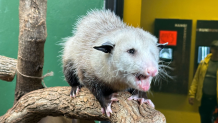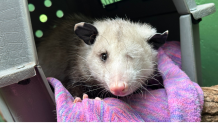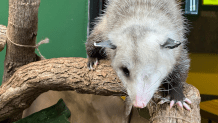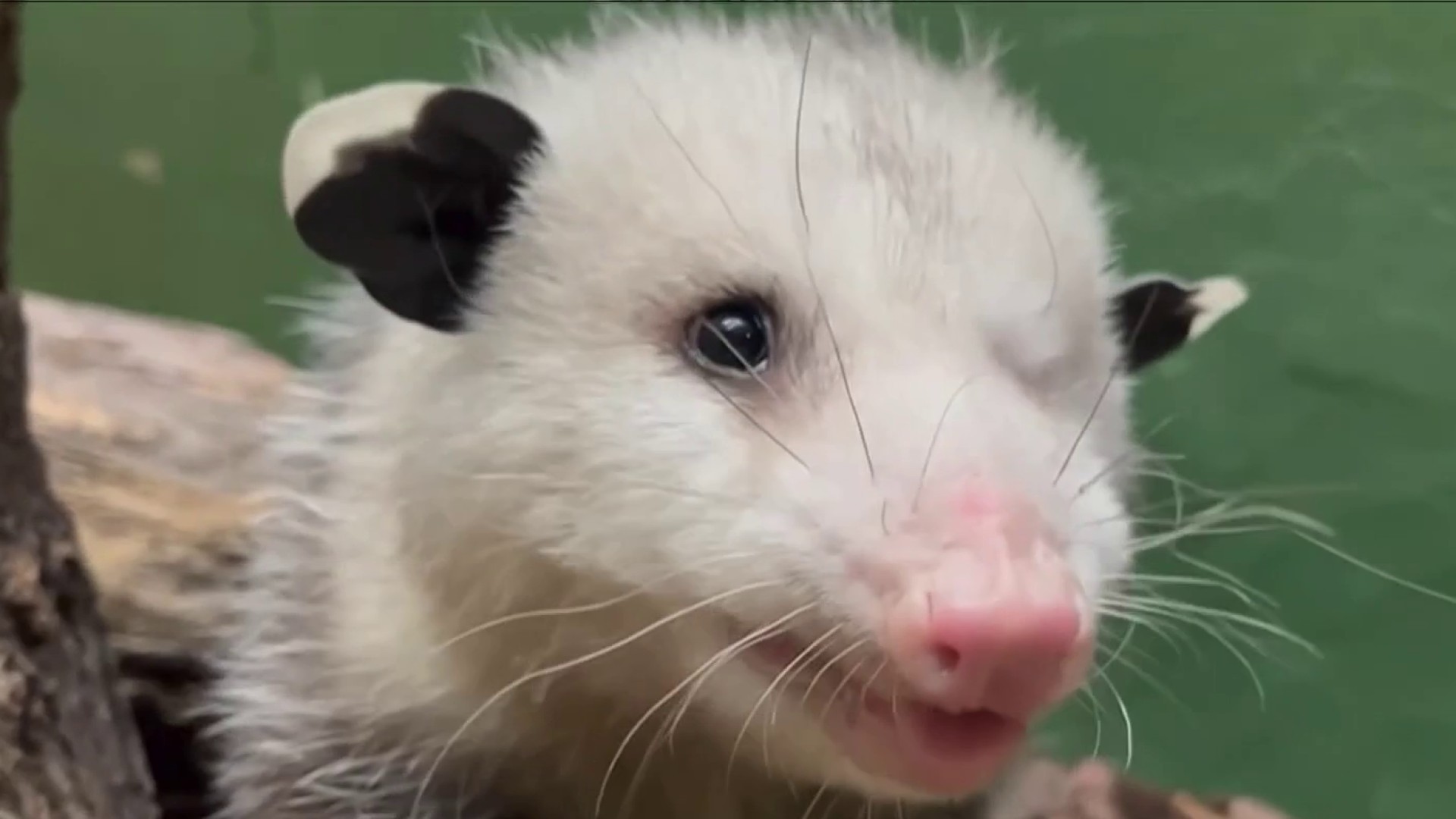When Basil the Virginia opossum arrived at the National Zoo over the summer, he had been injured by a predator attack, lost one eye, and was unlikely to survive in the wild due to his injuries.
Now, D.C.'s hometown hero has gone from the bottom of the heap to king of the News4 Zoo Bracket.
That's right -- thanks to you, Basil the one-eyed opossum is officially D.C.'s Next Animal Obsession. More than 155,000 votes were cast in our bracket challenge, with Basil triumphing over the lion, the tiger and the sloth bear.
Here's how he reacted when we told him the news:
We're making it easier for you to find stories that matter with our new newsletter — The 4Front. Sign up here and get news that is important for you to your inbox.

Read on to learn more about the District local now living in the National Zoo's Small Mammal House, and four fun facts about the species for which he serves as an ambassador.
1. Opossums are marsupials
Contrary to what you may think after spotting that pink nose and long tail, opossums like Basil are not rodents. They're actually the only marsupial that lives in North America.
The vast majority of marsupials live in Australia, according to the country's national science agency, and most of the others call South America home.
Much like the other members of the marsupial family -- which includes wombats, kangaroos and koalas -- female opossums carry their young around in a pouch.
When baby opossums are born, they're about the size of a honeybee, and they're totally helpless, according to the National Zoo.
"They climb directly into their mother’s pouch after birth to nurse," the zoo said in a press release. "Once they get too big for the pouch, they will climb onto mom’s back and ride there until they are fully grown."
Opossums have an opposable "thumb" on their hind feet, which helps them cling to Mom when they're young, according to the Canadian Broadcasting Corporation. Once they get older, it helps them climb trees and survive on their own.

2. Opossums are not the same as possums
Though we in North America often shorten the name "opossum" to just "possum," the words actually describe two entirely different animals.
Australia is home to several species of possums, according to Australian Geographic -- and none of them are quite as scraggly-looking as the Virginia opossum we see in backyards around the United States.
It turns out that researchers believe that early relatives of the opossum actually wandered from South America into Australia millions of years ago, when the continents were joined.
That common ancestor led to all those Australian marsupials, including its possums, and to the opossum now living at the Smithsonian.

3. Opossums help control pests
While the disheveled and muppet-y appearance of opossums might give you some pause if you see this critter in the wild, opossums are no threat to people.
In fact, opossums help control the population of something that is a hazard to humans: ticks.
Opossums are a scavenger species, and like most fuzzy creatures, ticks love to burrow in their fur as they wander around. But when opossums groom themselves, they also eat the ticks that have latched on.
"In this way, opossums help to control tick populations, which is great for humans and our pets, too!" the National Zoo said.
Their position as scavengers means opossums aren't picky. Their diet includes insects, small rodents, and even some snakes -- but they dabble in vegetation, too.
And according to the Canadian Broadcasting Corporation, opossums can digest just about anything, including bones, without getting sick and spreading disease. That means they're keeping those diseases out of the environment.
They're unlikely to carry rabies, according to the Centers for Disease Control and Prevention, and wild opossums don't attack so long as you keep your distance and are respectful of their space, according to the National Zoo.
As another bonus, opossums also tend to leave homes alone, according to the Canadian Broadcasting Corporation, without chewing through wires or scurrying into attics.
4. Opossums are not endangered
Unlike many of the animals housed at the National Zoo, opossums aren't endangered -- in fact, the zoo classifies them as "of least concern."
They still have predators, ranging from birds of prey to the dogs humans keep as pets, if the dogs aren't leashed.
But the National Zoo hopes Basil will serve as an important messenger for his species, and for conservation efforts as a whole.
"Historically, all species were of least concern at one point," the zoo said in a press release. "If we took the necessary steps to protect our endangered species before they became endangered, we could have made a big difference in those species’ current wild population status. It is still important for us to be aware of species that are currently not threatened, so that we can protect existing wild populations."
Facts about Basil, DC's newest animal obsession
According to the National Zoo, Basil is non-releasable. The animal attack that caused him to lose his eye and sent him to City Wildlife, an organization that rehabilitates injured and orphaned wildlife in Washington, D.C., also means he would not survive in the wild.
The National Zoo is therefore his permanent home -- but he's settled in nicely.
"He willingly interacts with keepers and seems to be exploring his exhibit overnight," the zoo press release from September said. "He does spend most of his days sleeping because opossums are nocturnal. When we interact with him, we’ve learned that he is curious, mellow and very much enjoys being cozy!"
The zoo added that Basil loves fleece blankets, curling up in the logs of his exhibit, and foraging for snacks.
He loves eating capelin fish, mice, canned wet food and bananas, and is apparently "not a big fan of mushrooms or green peppers," the zoo said.
You can visit Basil in the National Zoo's Small Mammal House. Timed-entry passes are required to enter the National Zoo, and include entry into the House. Entry passes free, and you can get them online.




